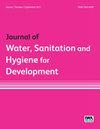了解小型非政府组织在东非实现可持续发展目标6过程中获取和使用地质数据和专业知识的情况
IF 1.4
4区 环境科学与生态学
Q3 WATER RESOURCES
Journal of Water Sanitation and Hygiene for Development
Pub Date : 2023-04-27
DOI:10.2166/washdev.2023.233
引用次数: 0
摘要
地下水资源有潜力满足东非脆弱社区的用水需求。为了确保这些地下水资源得到可持续管理,地下水管理人员必须掌握并利用丰富的地质知识。小型非政府组织是在偏远和弱势社区从事与水有关的项目的一种从业者。这项研究旨在通过在线调查和关键线人访谈,了解参与水相关项目的小型非政府组织获取和使用地质数据和专业知识的情况。该研究表明,小型非政府组织希望使用地质数据,但官僚作风使其难以访问免费的现有政府地质数据源,而且数据集并不总是存储得当。资金限制阻碍了小型非政府组织从其他来源获取高质量地质数据和聘请适当专业知识的能力。捐助者对地质数据的价值缺乏了解,影响了小型非政府组织为收集或获取地质数据编列预算并包括所需时间的能力。有必要认识到小型非政府组织等应对水资源挑战的关键行为者在地质数据和专业知识的可用性和可及性方面存在的这些障碍,并采取措施加以解决。本文章由计算机程序翻译,如有差异,请以英文原文为准。
Understanding small NGOs' access to and use of geological data and expertise in delivering SDG 6 in eastern Africa
Groundwater resources have the potential to meet the water demands of vulnerable communities in eastern Africa. To ensure such groundwater resources are managed sustainably, robust geological knowledge must be available and utilised by those managing groundwater. Small NGOs are one type of practitioner working on water-related projects with remote and vulnerable communities. This study aimed to understand the access to and use of geological data and expertise by small NGOs involved in water-related projects, through an online survey and key-informant interviews. The study revealed that small NGOS want to use geological data but bureaucracy makes it difficult to access free, existing government geological data sources, and that datasets are not always stored appropriately. Funding constraints hinder the ability of small NGOs to access quality geological data from other sources and to hire appropriate expertise. Donors' lack of understanding of the value of geological data affects the ability of small NGOs’ to budget for and include the time needed to collect or access geological data. There is a need to recognise these barriers to the usability and accessibility of geological data and expertise by key actors working on water challenges, such as small NGOs, and take steps to address them.
求助全文
通过发布文献求助,成功后即可免费获取论文全文。
去求助
来源期刊

Journal of Water Sanitation and Hygiene for Development
WATER RESOURCES-
CiteScore
3.10
自引率
11.80%
发文量
58
审稿时长
16 weeks
期刊介绍:
The Journal of Water, Sanitation and Hygiene for Development is a peer-reviewed journal devoted to the dissemination of high-quality information on the science, policy and practice of drinking-water supply, sanitation and hygiene at local, national and international levels.
 求助内容:
求助内容: 应助结果提醒方式:
应助结果提醒方式:


